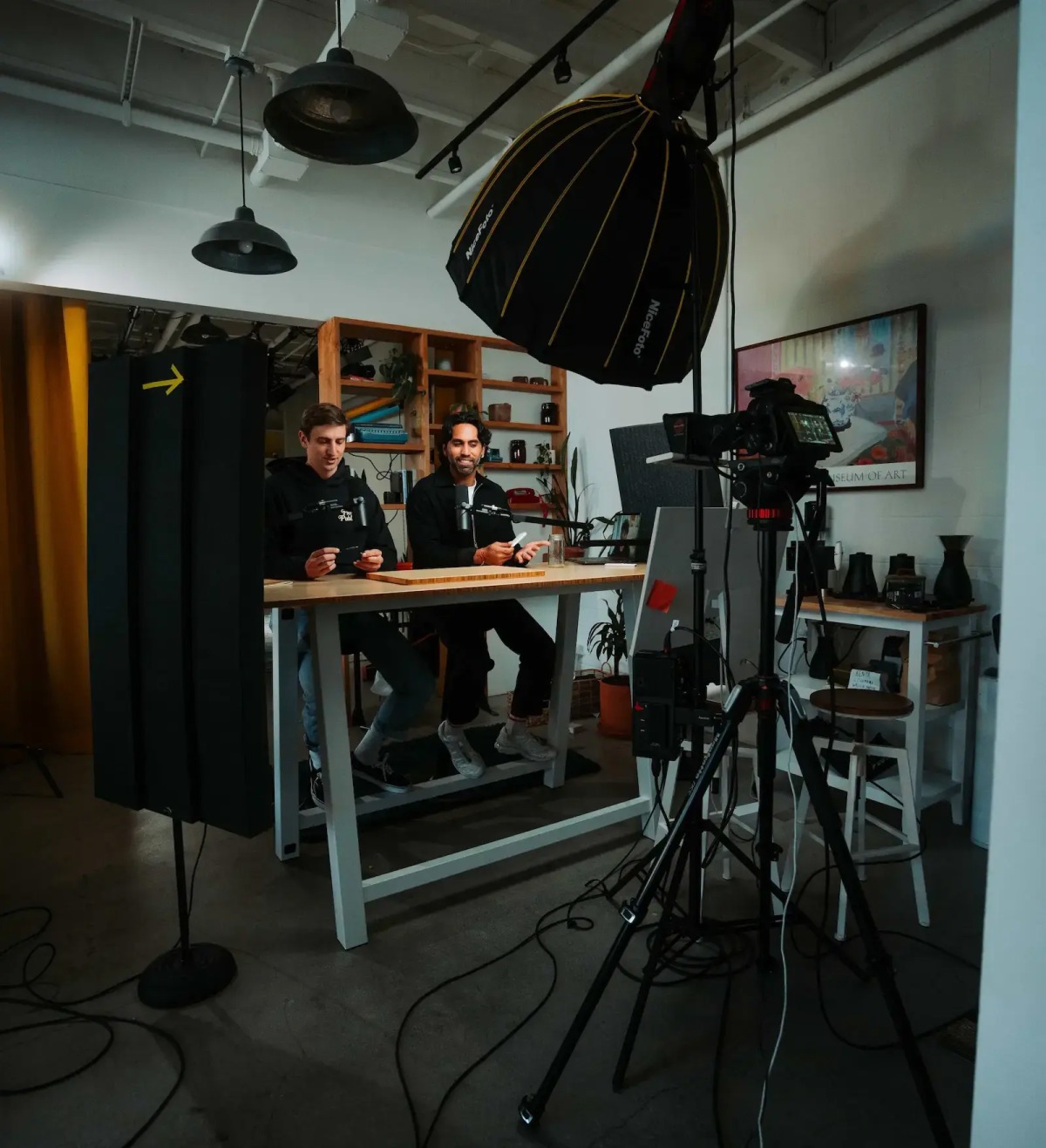Creators Colin and Samir team with Kajabi to release Creator Startup
Content creators Colin Rosenblum and Samir Chaudry, aka Colin and Samir, have built a media company around their mission to “educate and empower” the next generation of creators. The way they see it, the content from their YouTube channel, podcast, newsletter, and Discord community detailing the ins and outs of the creator economy is like writing a textbook for creators in real-time.
“And [we] still believe that,” Rosenblum says. “But [we were] thinking about how different it is to own a textbook than it is to go to class.”
So, for the past two years, Rosenblum and Chaudry have been developing a curriculum for what would eventually become Creator Startup, their just launched and first-ever online course designed for creators ready to level up.
Released in partnership with Kajabi, a platform for creators to build websites, facilitate payments, and more, Creator Startup is a 30-day cohort with live sessions, guided worksheets, and videos aimed at unpacking what Rosenblum and Chaudry have identified as the four key pillars of a creator business: defining your audience, figuring out your value proposition, understanding your process, and, of course, how to monetize.
Creator Startup was born out of conversations Rosenblum and Chaudry have had with fellow creators on and off camera, as well as their personal hurdles and hiccups in building their media startup, The Publish Company, that houses their various endeavors.
[Photo: courtesy of Colin & Samir]
“There was a time where we were doing sporadic brand partnerships, and we couldn’t really understand how to make them consistent,” Chaudry says. “How do you develop predictable monthly revenue in this space? How do you set yourself up to sell long-term partnerships? That was a very frustrating experience for us. There were a lot of years where we felt like we just couldn’t put the pieces together to have this career we really wanted.”
That said, Rosenblum and Chaudry are clear that Creator Startup isn’t for creators just starting out. The proper demo for the course, which is priced at just under $1,800, is for creators who have done brand deals in the past and who already have a system in place for consistently creating videos.
“When you’re in the exploratory phase, you’re looking to experiment with content. You’re looking for ideas. And we believe you can get that from our show and our newsletter,” says Chaudry, who also notes they’ll still be producing their free content. “But when you want to get into what we call the development and growth stage of your career, where you’re like, I’m crafting a brand that’s actually now turning into something, that’s when I think you’re ready to invest and formally learn about how to do this.”
Making that decision to invest the time and money to build an actual creator business is one not made lightly.

[Photo: courtesy of Colin & Samir]
More than 200 million people globally call themselves creators, but only a slight fraction have been able to translate an online audience into an actual living. According to a report from link-in-bio service Linktree, 72% of creators made less than $500 in that past year since the report’s release last September.
Inconsistent and insufficient revenue, burnout, and the unpredictability of platform algorithms have become formidable barriers keeping creators from formalizing their online pursuits into a business—let alone a viable one. But Rosenblum and Chaudry feel that the lack of education around the creator economy shouldn’t be a barrier in itself.
For as many years as the creator economy has been around, there hasn’t been a formal education structure and career path for it like there is in, say, becoming a doctor or lawyer. Slowly, traditional universities are adding creator economy courses to their offerings. But as entrepreneurship has evolved with the creator economy, so has education. It’s why creator and talent management company Whalar is building creator economy campuses—with Rosenblum and Chaudry on their creator council, naturally. It’s how platforms such as Kajabi, where creators are largely selling their expertise, can serve 75 million customers through 100,000 creator businesses that have earned more than $6 billion in revenue.

Ahad Khan [Photo: Kajabi]
“The way people learn has shifted a lot,” says Kajabi CEO Ahad Khan. “It used to be you go to a four-year college and this is your one opportunity to learn. And it’s shifting to lifelong learning and skill development.” To Khan, in certain regards, people are turning away from jockeying to attend storied education institutions and buying into finding voices and points of view they trust.
Creator Startup is designed to give creators a roadmap toward building their own media companies. As it pertains to what captures audiences’ attention, we’ve seen creator-driven media sit alongside—and, in some cases, supersede—content from “traditional” media companies. So why shouldn’t the means to create a business around “untraditional” content be just unconventional, too?
“It’s a bit meta,” Chaudry says of partnering with Kajabi to release Creator Startup. “When we started talking to Kajabi, it felt like there was a bit more engagement that we could have not only to educate our audience, but educate the broader community about the world of online education and what that looks like as a monetization path for creators.”
Content creators Colin Rosenblum and Samir Chaudry, aka Colin and Samir, have built a media company around their mission to “educate and empower” the next generation of creators. The way they see it, the content from their YouTube channel, podcast, newsletter, and Discord community detailing the ins and outs of the creator economy is like writing a textbook for creators in real-time.
“And [we] still believe that,” Rosenblum says. “But [we were] thinking about how different it is to own a textbook than it is to go to class.”
So, for the past two years, Rosenblum and Chaudry have been developing a curriculum for what would eventually become Creator Startup, their just launched and first-ever online course designed for creators ready to level up.
Released in partnership with Kajabi, a platform for creators to build websites, facilitate payments, and more, Creator Startup is a 30-day cohort with live sessions, guided worksheets, and videos aimed at unpacking what Rosenblum and Chaudry have identified as the four key pillars of a creator business: defining your audience, figuring out your value proposition, understanding your process, and, of course, how to monetize.
Creator Startup was born out of conversations Rosenblum and Chaudry have had with fellow creators on and off camera, as well as their personal hurdles and hiccups in building their media startup, The Publish Company, that houses their various endeavors.

[Photo: courtesy of Colin & Samir]
“There was a time where we were doing sporadic brand partnerships, and we couldn’t really understand how to make them consistent,” Chaudry says. “How do you develop predictable monthly revenue in this space? How do you set yourself up to sell long-term partnerships? That was a very frustrating experience for us. There were a lot of years where we felt like we just couldn’t put the pieces together to have this career we really wanted.”
That said, Rosenblum and Chaudry are clear that Creator Startup isn’t for creators just starting out. The proper demo for the course, which is priced at just under $1,800, is for creators who have done brand deals in the past and who already have a system in place for consistently creating videos.
“When you’re in the exploratory phase, you’re looking to experiment with content. You’re looking for ideas. And we believe you can get that from our show and our newsletter,” says Chaudry, who also notes they’ll still be producing their free content. “But when you want to get into what we call the development and growth stage of your career, where you’re like, I’m crafting a brand that’s actually now turning into something, that’s when I think you’re ready to invest and formally learn about how to do this.”
Making that decision to invest the time and money to build an actual creator business is one not made lightly.

[Photo: courtesy of Colin & Samir]
More than 200 million people globally call themselves creators, but only a slight fraction have been able to translate an online audience into an actual living. According to a report from link-in-bio service Linktree, 72% of creators made less than $500 in that past year since the report’s release last September.
Inconsistent and insufficient revenue, burnout, and the unpredictability of platform algorithms have become formidable barriers keeping creators from formalizing their online pursuits into a business—let alone a viable one. But Rosenblum and Chaudry feel that the lack of education around the creator economy shouldn’t be a barrier in itself.
For as many years as the creator economy has been around, there hasn’t been a formal education structure and career path for it like there is in, say, becoming a doctor or lawyer. Slowly, traditional universities are adding creator economy courses to their offerings. But as entrepreneurship has evolved with the creator economy, so has education. It’s why creator and talent management company Whalar is building creator economy campuses—with Rosenblum and Chaudry on their creator council, naturally. It’s how platforms such as Kajabi, where creators are largely selling their expertise, can serve 75 million customers through 100,000 creator businesses that have earned more than $6 billion in revenue.

Ahad Khan [Photo: Kajabi]
“The way people learn has shifted a lot,” says Kajabi CEO Ahad Khan. “It used to be you go to a four-year college and this is your one opportunity to learn. And it’s shifting to lifelong learning and skill development.” To Khan, in certain regards, people are turning away from jockeying to attend storied education institutions and buying into finding voices and points of view they trust.
Creator Startup is designed to give creators a roadmap toward building their own media companies. As it pertains to what captures audiences’ attention, we’ve seen creator-driven media sit alongside—and, in some cases, supersede—content from “traditional” media companies. So why shouldn’t the means to create a business around “untraditional” content be just unconventional, too?
“It’s a bit meta,” Chaudry says of partnering with Kajabi to release Creator Startup. “When we started talking to Kajabi, it felt like there was a bit more engagement that we could have not only to educate our audience, but educate the broader community about the world of online education and what that looks like as a monetization path for creators.”
